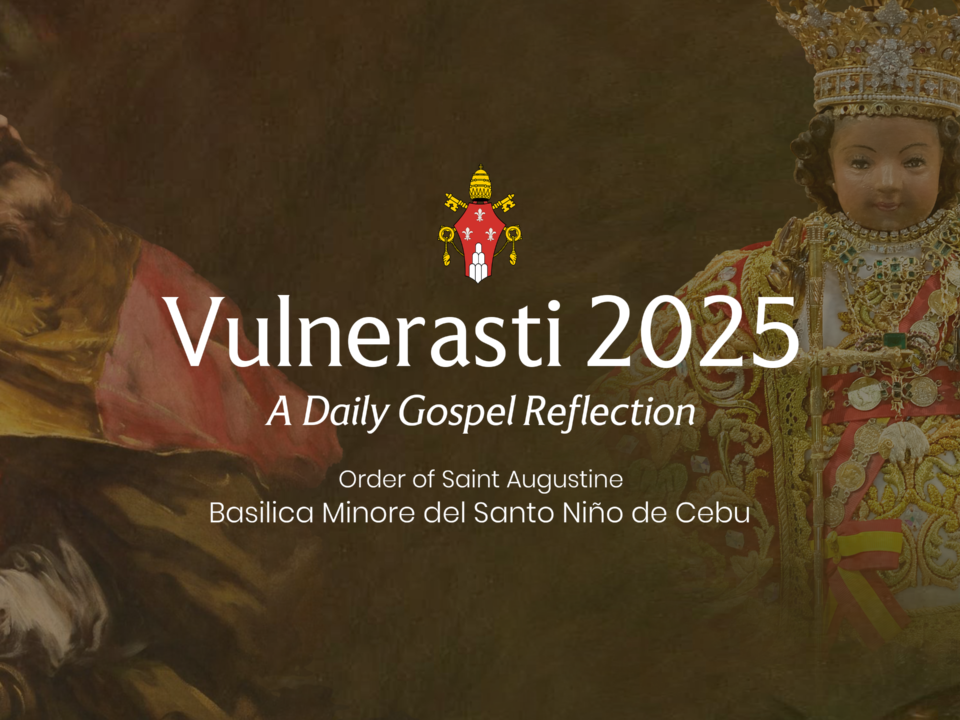November 7, 2025
November 7, 2025
At another time Jesus told his disciples, “There was a rich man, whose steward was reported to him because of fraudulent service. He summoned the steward and asked him, ‘What is this I hear about you? I want you to render an account of your service, for it is about to be terminated.’
The steward thought to himself, ‘What am I to do now? My master will surely dismiss me. I am not strong enough to do hard work, and I am ashamed to beg. I know what I will do: I must make sure that when I am dismissed, there will be people who will welcome me into their homes.’
So he called his master’s debtors, one by one. He asked the first debtor, ‘How much do you owe my master?’ The reply was, ‘A hundred jars of oil.’ The steward said, ‘Here is your bill. Sit down quickly and write fifty.’ To the second debtor he put the same question, ‘How much do you owe?’ The answer was, ‘A hundred measures of wheat.’ Then the steward said, ‘Take your bill and write eighty.’
The master commended the dishonest steward for his astuteness: for the people of this world are more astute, in dealing with their own kind, than are the people of light.
November 6, 2025
November 6, 2025
Meanwhile tax collectors and sinners were seeking the company of Jesus, all of them eager to hear what he had to say. But the Pharisees and the teachers of the law frowned at this, muttering, “This man welcomes sinners and eats with them.” So Jesus told them this parable: “Who among you, having a hundred sheep and losing one of them, will not leave the ninetynine in the wilderness, and seek the lost one till he finds it? And finding it, will he not joyfully carry it home on his shoulders? Then he will call his friends and neighbors together, and say, ‘Celebrate with me, for I have found my lost sheep!’ I tell you, in the same way, there will be more rejoicing in heaven over one repentant sinner, than over ninety-nine decent people, who do not need to repent.
What woman, if she has ten silver coins and loses one, will not light a lamp, and sweep the house in a thorough search, till she finds the lost coin? And finding it, she will call her friends and neighbors, and say, ‘Celebrate with me, for I have found the silver coin I lost!’ I tell you, in the same way, there is rejoicing among the angels of God over one repentant sinner.”
November 5, 2025
November 5, 2025
One day, when large crowds were walking along with Jesus, he turned and said to them, “If you come to me, unwilling to sacrifice your love for your father and mother, your spouse and children, your brothers and sisters, and indeed yourself, you cannot be my disciple. Whoever does not follow me, carrying his own cross, cannot be my disciple.
Do you build a house without first sitting down to count the cost, to see whether you have enough to complete it? Otherwise, if you, have laid the foundation and are not able to finish it, everyone will make fun of you: ‘This fellow began to build and was not able to finish.’
And when a king wages war against another king, does he go to fight without first sitting down to consider whether his ten thousand can stand against the twenty thousand of his opponent? And if not, while the other is still a long way off, he sends messengers for peace talks. In the same way, none of you may become my disciple, if he doesn’t give up everything he has.
November 4, 2025
November 4, 2025
Upon hearing these words, one of those at the table said to Jesus, “Happy are those who eat at the banquet in the kingdom of God!”
Jesus replied, “A man once gave a feast and invited many guests. When it was time for the feast, he sent his servant to tell those he had invited to come, for everything was ready. But all alike began to make excuses. The first said, ‘Please excuse me. I must go and see the piece of land I have just bought.’ Another said: ‘I am sorry, but I am on my way to try out the five yoke of oxen I have just bought.’ Still another said, ‘How can I come, when I’ve just got married?’
The servant returned alone, and reported this to his master. Upon hearing his account, the master of the house flew into a rage, and ordered his servant, ‘Go out quickly, into the streets and alleys of the town, and bring in the poor, the crippled, the blind and the lame.’ The servant reported after a while, ‘Sir, your orders have been carried out, but there is still room.’ The master said, ‘Go out to the highways and country lanes, and force people to come in, to ensure that my house is full. I tell you, none of those invited will have a morsel of my feast.”
November 3, 2025
November 3, 2025
Jesus also addressed the man who had invited him, and said, “When you give a lunch or a dinner, don’t invite your friends, or your brothers and relatives, or your wealthy neighbors. For surely they will also invite you in return, and you will be repaid. When you give a feast, invite instead the poor, the crippled, the lame and the blind. Fortunate are you then, because they cannot repay you. You will be repaid at the resurrection of the upright.”
November 2, 2025
November 2, 2025
When the Son of Man comes in his glory with all his angels, he will sit on the throne of his glory. All the nations will be brought before him; and, as a shepherd separates the sheep from the goats, so will he do with them, placing the sheep on his right hand and the goats on his left. The king will say to those on his right, ‘Come, blessed of my Father! Take possession of the kingdom prepared for you from the beginning of the world. For I was hungry, and you fed me. I was thirsty, and you gave me something to drink. I was a stranger, and you welcomed me into your home. I was naked, and you clothed me. I was sick, and you visited me. I was in prison, and you came to see me.’ Then the righteous will ask him, ‘Lord, when did we see you hungry, and give you food; thirsty, and give you something to drink; or a stranger, and welcome you; or naked, and clothe you? When did we see you sick, or in prison, and go to see you?’ The king will answer, ‘Truly I say to you: just as you did it for one of the least of these brothers or sisters of mine, you did it to me.’ Then he will say to those on his left, ‘Go, cursed people, out of my sight, into the eternal fire, which has been prepared for the devil and his angels! For I was hungry, and you did not give me anything to eat; I was thirsty, and you gave me nothing to drink; I was a stranger, and you did not welcome me into your house; I was naked, and you did not clothe me; I was sick, and in prison, and you did not visit me.’ They, too, will ask, ‘Lord, when did we see you hungry, thirsty, naked or a stranger, sick or in prison, and did not help you?’ The king will answer them, ‘Truly I say to you: just as you did not do it for one of the least of these, you did not do it for me.’ And these will go into eternal punishment; but the just, to eternal life.”
November 1, 2025
November 1, 2025
When Jesus saw the crowds, he went up the mountain,
and after he had sat down, his disciples came to him.
He began to teach them, saying:
"Blessed are the poor in spirit,
for theirs is the Kingdom of heaven.
Blessed are they who mourn,
for they will be comforted.
Blessed are the meek,
for they will inherit the land.
Blessed are they who hunger and thirst for righteousness,
for they will be satisfied.
Blessed are the merciful,
for they will be shown mercy.
Blessed are the clean of heart,
for they will see God.
Blessed are the peacemakers,
for they will be called children of God.
Blessed are they who are persecuted for the sake of righteousness,
for theirs is the Kingdom of heaven.
Blessed are you when they insult you and persecute you
and utter every kind of evil against you falsely because of me.
Rejoice and be glad,
for your reward will be great in heaven."
October 31, 2025
October 31, 2025
One Sabbath Jesus had gone to eat a meal in the house of a leading Pharisee, and he was carefully watched. In front of him was a man suffering from dropsy; so Jesus asked the teachers of the law and the Pharisees, “Is it lawful to heal on the Sabbath, or not?” But no one answered. Jesus then took the man, healed him, and sent him away. And he said to them, “If your lamb or your ox falls into a well on a Sabbath day, who among you doesn’t hurry to pull it out?” And they could not answer.
October 30, 2025
October 30, 2025
In the Gospel, Jesus receives the tragic news of his imminent death. He laments over Jerusalem because of their stubbornness of hearts. But Jesus remained steadfast in the light of this news to fulfill the plan of the salvation of God. It reminds us, like Jesus, to be faithful to our responsibilities and mission to fulfill God’s plan of salvation for us.



